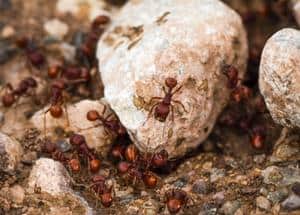Flying ants in pool can ruin all the fun of swimming. These insects must not stay between your favorite summer activity and you. Don’t worry, while it is a common problem in many parts of our country, I know the best ways to get rid of this menace for good.
So, if you have found clusters of ants in pool don’t worry, you can deal with the situation. Before you kill them, you need to provide your own investigation on the type of ants and the reason they are in your pool.
My article will help you to understand which type attacked you and how to get them out.
Flying Ants in Your Yard
Some ants live indoors, while others prefer the outdoors. Living inside the pool is not commonplace for ants, based on their inability to swim. However, this is not a rare problem across the country.
Why Do Ants Keep Getting in My Pool?
Let’s start with the basics. Why do ants keep getting in my pool? If you believe that the reason is in your awesomeness and sweetness, well, I must disappoint you. They don’t pick a specific person to attack. Moreover, they don’t care how stylish your pool is either.
The major reason why ants are hitting on your pool is the water inside. Ants like water. They need to live somewhere nearby. Usually, ants build colonies near the open access to the water.
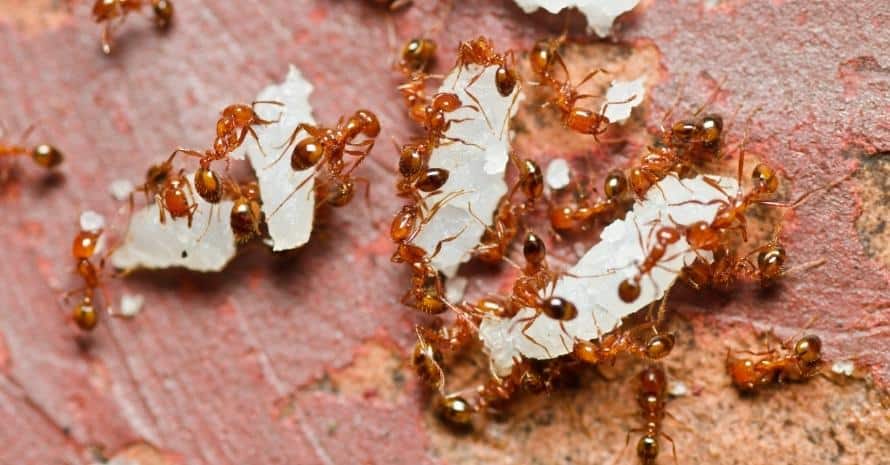
It means that once you cut them out of their water source, they will be gone. If you find dead ants near your pool, the chances are you have ants in the pool. You need to act immediately!
Another attraction to ants is the magnetic field that is present in the wide range of mechanics you use in the pool. Think about the instruments you are using to pump the water or to check the temperature inside.
Is there anything that has a magnetic field? Some ants can even start chewing the wires. If they settle down nearby, they will use wires to build the nest.
The last but not least attraction to these insects is the reflective surface. Once the sun comes out, the pool attracts ants. You will say that this is the perfect time to swim. You are more than right. This is why you have to stop them in the first place.
Types of Flying Ants in Pool
There are thousands of types of ants. Yet, there is a limited amount of ants in the swimming pool. You can easily recognize them if you have basic knowledge about them.
Once you recognize the type, you will be able to get rid of them in a more reliable way. Some insecticides are created for specific types of ants. They considered being the most helpful. If you can barely distinguish one insect from another, read my guide.
Black Ants
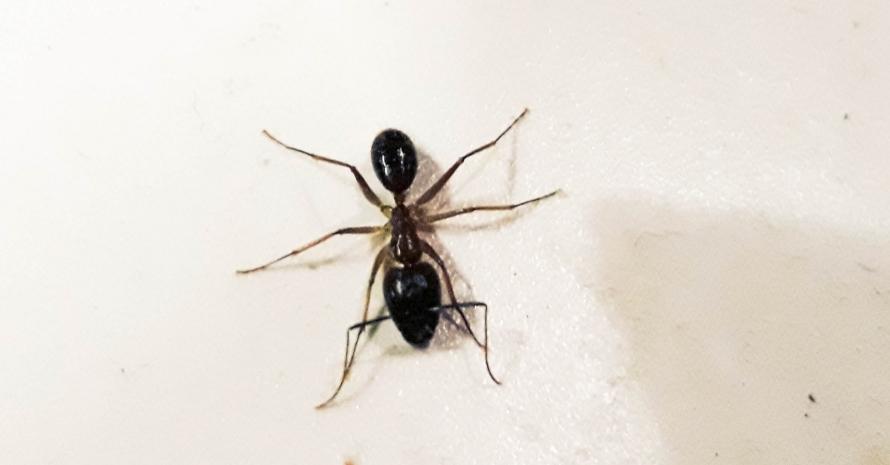
Black ants are widely known in the US. Without any doubt, you have already seen it at least once in your life. They are also called black garden ants. They have small black bodies.
Usually, they fly during the summer. You can see them in July or August. If you notice these ants with wings in pool, you need to take measures quickly. One colony can reach up to 40 000 ants. The average number is 5 000 – 7 000 workers.
Carpenter Ants
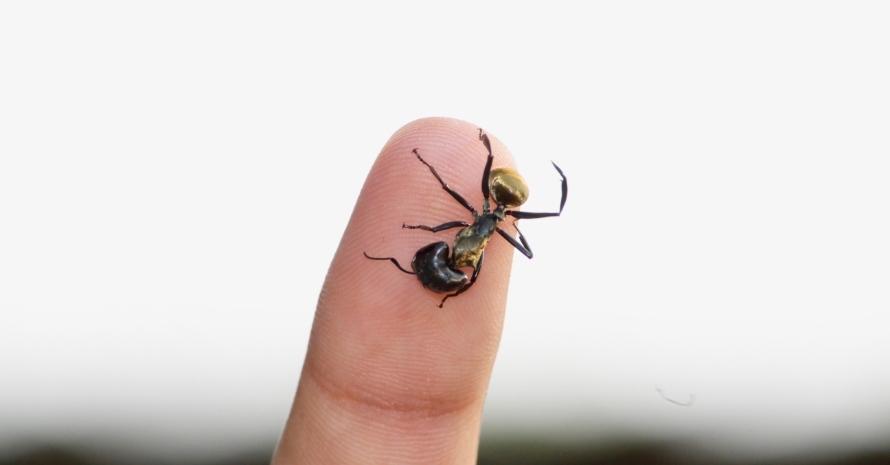
Carpenter ants have dark brown and reddish bodies. Their waists are narrow, antennae are bent, and wings on their backs are smaller than in front. Their favorite place to live is wood, but struggling without water they are eager to relocate.
Fire Ants
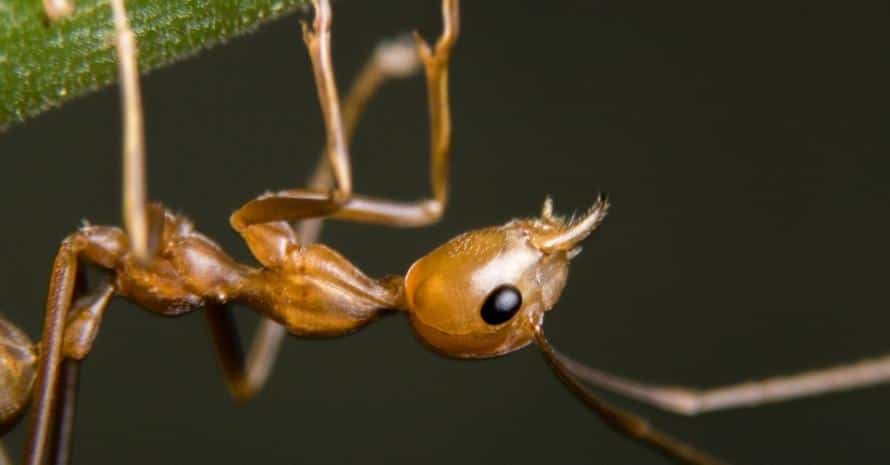
Fire ants sting, so you will quickly recognize them. They are also called ginger ants because of their red color. Fire ants are longer than a carpenter or black ants. Their heads are colored in copper brown, abdomens are dark. They live in big colonies.
These could also be termites
Here is some “good news” for you, just in case you have relaxed already, learning all the possible species. Well, not so fast. Sometimes it may turn out that your flying ants in swimming pool are not actually ants.
They are termites that simply look like ants. You will recognize termites by straight and not bent antennae, wings longer than bodies, and a large waist.
The main reason why I believe that it is better to always check which species you are against is that it can be not even the ant but terminate. In this case, the insecticide you spray around will not work.
Step by step guide on getting rid of swimming pool ants
There are numerous methods on how to keep ants out of pool. I will describe the most popular options. You can try each of them or pick the one you believe is the most helpful:
Preventive
You may start with an unreflective cover over your pool and make sure there is no leak in the pipes. Flying ants will not fly to your pool if the water is hidden from them.
Apart from that, an unreflective cover will do its trick. They will not know that there is water under it. The main condition is that this cover must be reliable. You will have to use it every time you finish swimming. This cover is protective against other insects that like water as well;
Tennis balls
You will be surprised but your swimming pool ants are not swimmers at all. They need something to hold on to. Throw up to 5-6 tennis balls in the pool and they will gather on them.
Once the whole colony is on those balls, you can extract them using the skimmer with thick mesh. Act carefully and if you are afraid to drop some ants in the pool, use bigger mesh without holes;
Bug zapper
You may already have a bug zapper in your house against other insects. Well, it works well against ants too. While you definitely don’t need to place it close to the water, for obvious reasons, you can hang it on the tree far from the pool as the attraction.
This ant trap will keep ants far away from you, attracted to zapper more than to the water. Once flying ants come closer it will kill them;
Ant killers
The modern market offers a wide range of options for you. You can use the ant baits for the whole nest. You can try pesticides in sprays or different repellents. Some ant killers work instantly, others can be carried by ants to the colony and later kill every insect inside.
Sprays are useful against a few ants that fly randomly around the pool. Some pesticides are more helpful against specific types of ants. Check out the description before you buy anything. If you don’t want to use chemicals you can try natural remedies;
Natural killers
There are numerous natural oils and flowers that ants can’t stand. If you don’t want to use chemicals if one of your family members has an allergy or sensitive skin, you can try natural recipes. For example, you may use a few drops of peppermint oil or lavender near the pool. It will scare away ants.
Don’t put the oil inside the pool. If you have a garden nearby, you can always grow these hateful plants for the ants. If you have enough space near the pool, you can use tiki torches nearby to scare the ants with the smoke.
Ants don’t like smoke and will try to crawl away as soon as they feel it. Still! You have to be extremely careful with the fire.
Call the pest control
This is the last measure. They are professionals and quickly deal with severe infestations. If you have a big colony of ants there and you don’t know how to deal with it, you can call local pest control.
They will quickly solve the problem. For other cases, I recommend trying to solve the problem by yourself first.
How to prevent flying ants in pool
You can always act in advance to prevent “the war”. It is easier to protect your perimeter near the pool than to try to get ants out of the pool. This is how you can do it:
- You can start with removing decorative plants you placed near the pool. If it is not peppermint, lemongrass, or lavender that scare away ants, the plants will only attract more ants and insects. Apart from that, there may be water in jars that still did not soak into the ground or the plant. This water will be an extra benefit for thirsty ants;
- Cement the areas near the pool. Ants will not crawl further if there will be no grass and they will not feel the water. Apart from that, it is easier to watch for any changes that take place around the pool;
- Keep the place near the pool clean. If you like to have a snack while you are swimming or drink juice, don’t forget to clean everything after you. Make sure that there are no crumbs or spilled juice. Ants are attracted to any sweets or bread;
- Cover the pool once you are out. You can always protect your pool with a durable cover. Once you finish, spread the cover so no insects will be able to get inside.
FAQ
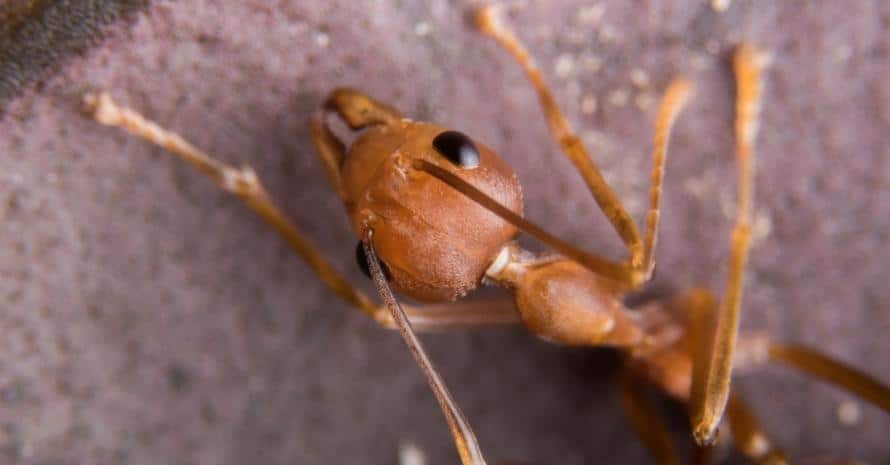
I have gathered here all the popular questions about flying ants in the pool I have found. I believe that my answers will be helpful to everyone who has to deal with ants. If you have more to add, you can easily do it in the comments below the article.
Why do flying ants suddenly appear?
There are lots of reasons for ants to come outside. It may start with one ant that searches the place filled with water and food for the colony. Once it notices the perfect place, the whole colony comes to check it out.
You can accidentally leave the pool open, ants can be attracted by the surface, and they can feel the water. You can leave crumbs near the pool.
Ants can even search for a safe space to hide from windy weather. You may cut the risks by following my recommendations above and constantly checking your pool. Don’t forget to clean the territory around it, not just inside of it.
How long do flying ants last?
You will be amazed to hear that some species can leave for up to 25 years. The colony is constantly growing, so you can’t possibly sit and wait till your enemies die. While male species can die several days after nuptial flight, queens live for many years. The average timeline is 15 years.
Yet, it depends on the food and water. If they don’t have anything to eat or drink they will starve and die fast. Yet, I also don’t recommend hoping that ants will die without your “help”. If you don’t want to kill insects, you can make them go away. The best option is to scare them away with the scents they hate.
Do flying ants sting you?
It depends on the type. Flying ants are the same as any other ants. Some of them sting, others do not. I have mentioned several different types of ants that can dwell inside your pool. They are the most popular types in most territories of the country.
Yet, only one type of them can bite you, which is the fire ant. You will quickly understand that this is it. This type has a typical red color and likes to sting people. You have to be careful approaching any insects.
Life Without Ants
While for now it may be hard to imagine a careless life without annoying ants in your pool, you have to follow my recommendations and your dreams will come true. Consider ants as the enemies you have to fight against for your right to be the master in your own pool again.
I recommend you to start with simple preventive measures, like buying a cover that is not reflective. Don’t forget to keep the place clean. Once the enemy is there, use insecticides.
Have you been attacked by the flying ants? How do you keep your pool clean? You can express your thoughts in the comments below.
Also read:
References
- Fire Ants(SHA Fact Sheet)
https://www.osha.gov/sites/default/files/publications/fire_ants.pdf - How to Kill Ants Outside(Kevin Carrillo MMPC, Pest Control Specialist)
https://www.wikihow.com/Kill-Ants-Outside - Ants don’t have to be a bother inside. Get rid of ants naturally(Faith Cathcart, Metro News)
https://www.oregonmetro.gov/news/ants-dont-have-be-bother-inside-get-rid-ants-naturally - Carpenter Ants(by Mike Potter, Extension Entomologist University of Kentucky College of Agriculture)
https://entomology.ca.uky.edu/ef603

